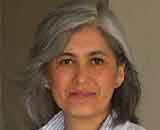 A pulse oximeter in the operating theatre doesn’t make surgery safer; it’s the anaesthesia provider using the oximeter effectively who will save lives.
A pulse oximeter in the operating theatre doesn’t make surgery safer; it’s the anaesthesia provider using the oximeter effectively who will save lives.
For Lifebox, the BMJ’s Christmas charity, provision of education is inseparable from donating equipment.
That’s why we’re excited to share a recent conversation with Sandra Leal the president of the association of medical anaesthetists in El Salvador (AMAES—Asociación de Médicos Anestesiólogos de el Salvador).
Sandra Leal has worked directly with El Salvador’s ministry of public health over the last few months to deliver a series of Lifebox training workshops across 30 hospitals to nearly 300 anaesthesia technicians in the north, south, east, and west of the country. They reached almost every anaesthesia technician working in a government hospital.
Next step: the ministry will distribute 87 Lifebox pulse oximeters donated thanks to last year’s BMJ Christmas Appeal!
Lifebox: Congratulations to you, the ministry of public health and AMAES on such a successful series of workshops. Have you had positive feedback?
Sandra: People said thank you, but you know it wasn’t just about the oximeters that are coming. It was the teaching.
There are only about 100 anaesthetists in El Salvador, so we rely on technicians a lot—but there’s really no continuing education. This was a first for them, coming together at these workshops. I think it was cathartic.
We used the clinical scenarios, and the technicians got to express opinions—they really got to think. They saw what medicine, real medicine, is about.
And for the first time they saw medical anaesthetists reaching out to really see what their needs were.
Lifebox: were you surprised by what you saw?
Sandra: I think I got a sharper education than they did. Going out into the country and talking to all these people—I had heard of their need, but had not had to face it. Some basic hospitals, only have a blood pressure cuff and that’s the whole of their monitoring system.
It was scary—maybe that’s the best word for it. When you’re used to working with certain standards, it’s hard to visualise people working without even the basics.
Lifebox: are problems with equipment frequent?
Sometimes things aren’t in perfect condition—this brings problems too. You know it’s not 100 percent functional, but what if it’s an emergency, an urgent procedure? An appendectomy, or a c-section that can’t be delayed—it doesn’t leave any choice but to get the procedure done.
Lifebox: Did you hear this frequently from the technicians?
Sandra: Again and again. It’s a major concern. They expressed over and over the stress that they work with everyday—every single surgery, trying to make the best of what they have. It’s exhausting. To be in the middle of a case and something just shuts down.
Lifebox: Those are difficult conditions for delivering safe surgery.
That’s how accidents happen—but they’re not really accidents, are they? An accident happens when you’ve taken all the precautions and something still goes wrong. When you don’t have what you need, but you have to go ahead anyway—that’s not the definition of an accident.
Lifebox: Do you think the WHO Surgical Safety Checklist can make a difference here?
Sandra: We introduced it as part of the workshops. People really accepted it, and it made sense to them. They had the idea, they just didn’t have the list, or all the equipment. The pulse oximeters will be a big help.
Lifebox: What are some other barriers to surgical safety?
Sandra: We have to break through the idea that it is going to work against them, that people are going to go after them like a witch-hunt. We have to get people used to the idea that the checklist, and the logbook are tools that will help them to do something better.
Lifebox: The ministry of health will shortly be distributing the donated Lifebox oximeters to ensure that all public government hospitals, which provide free care, have access to safe monitoring.
Did you hear reports from the technicians about the sort of difference these will make?
Sandra: They had stories that didn’t end well.
Even for small cases, people were turning blue and that’s the point when you know something’s going wrong. The oxygen saturation (Sp02) is down to 60 percent, way, way too low to be admissible, and all of a sudden a small case becomes more complicated.
We don’t have enough anesthesiologists in the country to cover all of the hospitals, and the technicians are on their own.
We got people excited—and now they’re ready. This is not the only thing we need, but it’s a huge start. These oximeters are going to make a difference.
Sandra Leal has been an anesthesiologist for almost 20 years. She works at Hospital Nacional Zacamil, El Salvador, a public 240 bed, 2nd level regional hospital, in the outskirts of the capital city.
Lifebox is the BMJ’s holiday charity this year. For more information, or to donate, see this week’s BMJ or visit www.lifebox.org. The BMJ campaign runs until the end of January.
